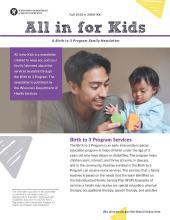Wisconsin Birth to 3 Program for Families
The Wisconsin Birth to 3 Program is a statewide program that serves families with children under the age of 3 who have developmental delays or disabilities. The Wisconsin Birth to 3 Program is an early intervention special education program. It helps children under the age of 3 who have delays or disabilities. “Early intervention” is the term used for these services and supports for babies and young children and their families. In Wisconsin, early intervention is known as the Birth to 3 Program. The Birth to 3 Program knows that your child’s first and most important relationships are with your family. Your child’s services will be shaped by your family’s:
- Culture
- Beliefs
- Individual needs
A team of professionals works with your child and your family. The services your family gets support your child’s development and growth, and your family’s knowledge, skills, and abilities. The Birth to 3 Program is here to help children grow and learn to their fullest potential.
Essential children's resources

Wisconsin Wayfinder supports families of children with delays, disabilities, special health care needs, and mental health conditions. Children’s resource guides are helpers who assist families, caregivers, professionals, and organizations in finding a wide array of supports and services available through the Children’s Resource Network.
The Birth to 3 Program team
Wisconsin Department of Health Services (DHS)
The Wisconsin Department of Health Services (DHS) supports each county Birth to 3 program at the state level.
You can contact DHS at the Bureau of Children's Services (BCS) Technical Assistance Center at DHSBCSTAC@dhs.wisconsin.gov or 608-267-6767.
County
The Birth to 3 Program is in every Wisconsin county. Local county programs work directly with families. County staff are there to:
- Help you understand the program.
- Make a referral to the Birth to 3 Program.
- Answer your questions.
- Help you get support and services.
Individualized Family Service Plan (IFSP) team
As part of the Birth to 3 Program, families have an IFSP. Your IFSP is a plan to help meet the unique goals of your family and child.
You are an important part of the IFSP team. Together, the team works to help your child be a part of your family’s daily routines and activities, both at home and in the community. The team includes professional service providers, such as:
- Early childhood special education teachers.
- Speech, occupational, and physical therapists.
- A service coordinator.
One of these professionals will be your primary coach. This coach will work with you during home visits. Their goal is to help support your child’s development and future education.
Services and supports

Together, the IFSP team will find ways to reach the goals that are part of your IFSP.
Services are based on your child’s goals. Your family’s goals will help decide:
- How services are offered.
- How often your child receives services.
- How long your child receives services.
Your IFSP might include:
- Special education services.
- Physical, occupational, and speech therapy.
- Service coordination.
- Other services.
The IFSP is updated at least every six months. It can always be changed, especially as your child learns, grows, and develops.
Your rights
Families who are part of the Birth to 3 Program have certain rights. These rights help each child and family get support and services fairly. DHS is committed to making the Birth to 3 Program available to all families.
- The Wisconsin Birth to 3 Program is an early intervention program. It is governed by the Individuals with Disabilities Education Act (IDEA). This is a federal law. It makes sure that children with disabilities get the services they need.
- Infants and toddlers with disabilities and their families get early intervention services under IDEA Part C.
- In Wisconsin, DHS is the lead agency for early intervention services. It’s called the Birth to 3 Program. Wisconsin administrative code DHS 90 has rules for carrying out the statewide program.
Certain rights are built into the Birth to 3 Program. You can view these rights at Your Child’s and Family’s Birth to 3 Program Rights, P-21106. Programs must follow specific steps. They must also respect your wishes about the services your family and child receive.
You might not agree with all aspects of the Birth to 3 Program. If you have a conflict with the program, you also have the right to seek a solution.
You might not agree with your county Birth to 3 Program about your child’s services. This is called a dispute. As a parent or caregiver, you have the right to disagree with the decisions made about your child’s:
- Eligibility
- Assessment results
- Services
- Payment of services
You might not agree with a decision that was made. Or you might not understand why a decision was made. There are many ways to find a solution. You can:
- Talk with the service coordinator.
- Ask questions when a decision is confusing.
- Ask for mediation.
- Ask for a due process hearing.
- File an IDEA complaint.
Resources

All in for Kids: A Birth to 3 Program Family Newsletter 2025 | 2024 | 2023 | 2022 | 2021 | 2020. Get the latest program news, highlights, tips, and resources.
- Wisconsin Birth to 3 Program First 1,000 Days Brochure, P-02928—Read about the Birth to 3 Program and how it works for your family and child.
- Parental Cost Share System Brochure, P-23165A—Understand potential program costs.
- Wisconsin Birth to 3 Program First 1,000 Days Postcard, P-02929—Get quick tips about tracking developmental milestones. Find helpful information about acting early when you notice signs of delays or disabilities.
- Families are the Foundation, P-22089—Find in-depth information about the Birth to 3 Program approach.
- Birth to 3 Program: Why is Early Intervention Important? This video explains why early intervention is important and how the Wisconsin Birth to 3 Program can help.
- Birth to 3 Program: Why is a Natural Environment Important? This video explains natural environments for families. Learn why providing services in the natural environment is important.
- Community resources—Find community supports that can:
- Help answer questions.
- Suggest programs and services.
- Help with legal questions.
- Interagency Coordinating Council—Attend a council meeting. Apply to be a member. As a member, you can give input on how the Birth to 3 Program provides services, supports, and other assistance to Wisconsin children and their families.
- Child Development—Find resources to:
- Understand your child’s development.
- Track your child’s milestones.
- Get ideas for helpful activities.
- Guiding Principles—View the framework for how decisions are made in the Birth to 3 Program.
- First 1,000 Days Outreach Campaign—Find resources to help spread the word about the Birth to 3 Program. Learn more about the Birth to 3 Program. Share with friends, family, and social groups. You’ll make an impact on the life of a child!
